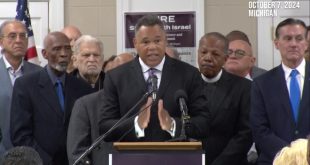 For anyone to admit that police-involved violence is a divisive topic in America today would be an understatement. Likewise, to deny that this issue is equally divisive, if not more so, among Christians is to be naively oblivious to reality.
For anyone to admit that police-involved violence is a divisive topic in America today would be an understatement. Likewise, to deny that this issue is equally divisive, if not more so, among Christians is to be naively oblivious to reality.
Does my saying that surprise you?
It shouldn’t.
There is a sense today that many followers of Jesus seem to have bought into the notion that Christian “oneness” (1 Corinthians 1:10-17; Romans 12:18) is defined solely in terms of being in complete agreement with one another on such issues as this; that obedience to our Lord’s command to “love one another” (John 13:34-35) is evidenced only by the absence of any signs of disunity or friction among those who profess to belong to Him (John 1:12-13,6:69; Ephesians 4:25-32).
But the truth is there are any number of worldly matters in which followers of Christ are clearly not united.
Then the word of the Lord came to Zechariah saying, Thus the Lord of hosts said, ‘Dispense true justice and practice kindness and compassion each to his brother; and do not oppress the widow or the orphan, the stranger or the poor; and do not devise evil in your hearts against one another.’ – Zechariah 7:8-10 (NASB)
The topic of biblical justice is only the latest in a veritable laundry list of discordant socio-cultural issues the evangelical church has had to deal with over the past half century (such as abortion and same-sex marriage).
Not that biblical justice is a new issue, mind you, but rather, as an issue, it is being experienced by an entirely new generation in entirely new ways, not the least of which is through unlimited access to smart devices and social media platforms that bring people face-to-face with incidents of police-involved violence often in real-time.
For the sake of context, I define biblical justice as:
The equitable application of God’s objective standard of righteousness, as revealed in the Bible, toward those who are created in the image of God by those who are likewise created in His image, and who, by virtue of God’s sovereign will, have been placed in positions of authority over them (Genesis 1:27; Proverbs 31:9; Micah 6:8; Romans 13:1-7).
It should go without saying that the pursuit of biblical justice, as a gospel mandate, applies to every Christian everywhere, whether individually or corporately (Isaiah 1:17; Micah 6:8; Matthew 28:19-20).
Nevertheless, this mandate, though scripturally sanctioned, should not be viewed as the all-or-nothing, by-any-means-necessary proposition many believers make it out to be.
For to hold to such a rigid paradigm of biblical justice is to risk breaking fellowship with others who are believers in Christ (Romans 8:16-17) but who, though equally committed to this mandate, may not necessarily perceive the issue through the exact same theological, philosophical, cultural, or ideological lens.
Can two people walk together without agreeing on the direction? – Amos 3:3 (NLT)
Interestingly, if not ironically, these same Scriptures that exhort us toward this pursuit also warn us of how easily such relational disintegration can occur; and how we must guard against allowing even our most well-intentioned efforts on behalf of the gospel to morph into self-centered idolatry.
A Commendable Purpose
In Acts chapter 15, Paul and Barnabas are ministering to Jewish believers in Antioch (vv. 22-34) who were being wrongly taught that circumcision was still a requisite for salvation (vv. 1-5).
After spending some time there (vv. 33-35), the two apostles mutually agreed that it would be a good idea to “return and visit the brethren in every city in which we proclaimed the word of the Lord, and see how they are” (v. 36).
That Paul and Barnabas would be so concerned for the welfare of their fellow brothers and sisters is commendable. After all, what is the gospel of Christ if not seeking the well-being of others in the name of Christ, and meeting those needs even if at great sacrifice to ourselves (Luke 21:1-4; John 15:13; 2 Corinthians 8:9-15; Galatians 6:9-10; James 1:27)?
But, you see, having a right purpose is not enough in and of itself.
It must be accompanied by a right heart-attitude.
A Contentious Disagreement
The brotherly unity exhibited by Paul and Barnabas toward one another was short-lived.
Having addressed the divisive teaching that was being propagated among the Antioch believers, the two missionaries soon found themselves pitted against one another over whether their fellow brother in Christ, John (Mark), should accompany them on their goodwill journey to the other churches.
Barnabas was in favor of the idea whereas Paul was not (Acts 13:13, 15:37-38).
The disagreement over John Mark was of such severity that we are told they “separated from one another” (v. 39).
To truly appreciate the depths of disharmony that existed between Paul and Barnabas, it is important to note that the Greek word separated in the aforementioned verse carries the same hermeneutical connotation as the word divorce.
So it can rightly be said that the divide between Paul and Barnabas was so contemptuous, so profound, so deep-seated as to be on the level of a husband and wife who decide to terminate their marriage (Mark 10:9).
It is a mindset that is often the case with Christians with regard to the issue of biblical justice.
Under the banner that biblical justice is mandated in the gospel, we allow our personal zeal for this mission to become such a point of contention that our own vision of how and by what means this mandate should come to fruition becomes more important than the mandate itself.
Why?
Simple.
We have forgotten whose mandate it is.
A Cautionary Example
Paul and Barnabas divided themselves over a fellow brother.
Think about that for a moment.
Two godly men, faithfully laboring together in the defense of the gospel of Jesus Christ, suddenly determine to separate from one another, not over an unbeliever – which might have been somewhat understandable – but over a fellow believer with whom they would one day share in the glories of heaven forever (Philippians 3:20).
But are you and I any more unified than were Paul and Barnabas?
Are we really any different than they?
No, not really.
In fact, I would argue that believers today are just as willing to separate themselves over the issue of biblical justice as were Paul and Barnabas over John Mark.
The evidence of this is all around us.
Instead of offering a Christ-focused gospel as an appropriate response to the matter of injustice in our society, we partition ourselves into one or more of the following “camps”:
- pro or anti-national anthem protests
- pro or anti-Black Lives Matter
- pro or anti-slavery reparations
- pro or anti-law enforcement
Consequently, the world comes to know us not for a gospel that addresses humanity’s innately sinful condition – which is at the root of all injustice – but for the infighting that exists among ourselves simply because we happen not to all see eye-to-eye on the various dynamics and nuances associated with this issue.
Such a distorted view of Christians by the world is to be expected when that which is mandated by the gospel becomes more important than the gospel itself.
And that, my brothers and sisters, is something we should never allow to happen.
Conclusion
In our pursuit of biblical justice, we must resist the temptation to become victims of what I call “John Mark Syndrome”.
John Mark Syndrome is what Paul and Barnabas suffered from.
It is taking a legitimate gospel mission and personalizing that mission in such a way that it becomes more about us than about the gospel.
And lest we forget, the gospel is about Jesus.
It is not about you or me.
Remember, the only reason there is a gospel at all is because Jesus, who is God in the flesh, condescended to us not the other way around (John 3:16; Romans 5:6; 1 Corinthians 1:30a; Ephesians 2:1-9; Colossians 2:9).
It is when we attempt to invert this truth that deep divisions occur and we divorce ourselves from one another to the detriment of our witness for Christ (Ephesians 4:29-32).
When you stop to consider the extent to which the issue of biblical justice continues to divide the church today, especially along racial and ethnic lines, the question we as believers must ask is:
Is it really worth it?
By Tony Webster from Minneapolis, Minnesota – Marching Downtown – Black Lives Matter, CC BY-SA 2.0, Wikimedia Commons
 Darrell B. Harrison is a Reformed Baptist, theologian, U.S. Army veteran, and blogger. He blogs at JustThinking.me.
Darrell B. Harrison is a Reformed Baptist, theologian, U.S. Army veteran, and blogger. He blogs at JustThinking.me.
The views expressed in opinion articles are solely those of the author and are not necessarily either shared or endorsed by Black Community News.
 CURE News and Clergy Blog News and Commentary for Christians
CURE News and Clergy Blog News and Commentary for Christians



